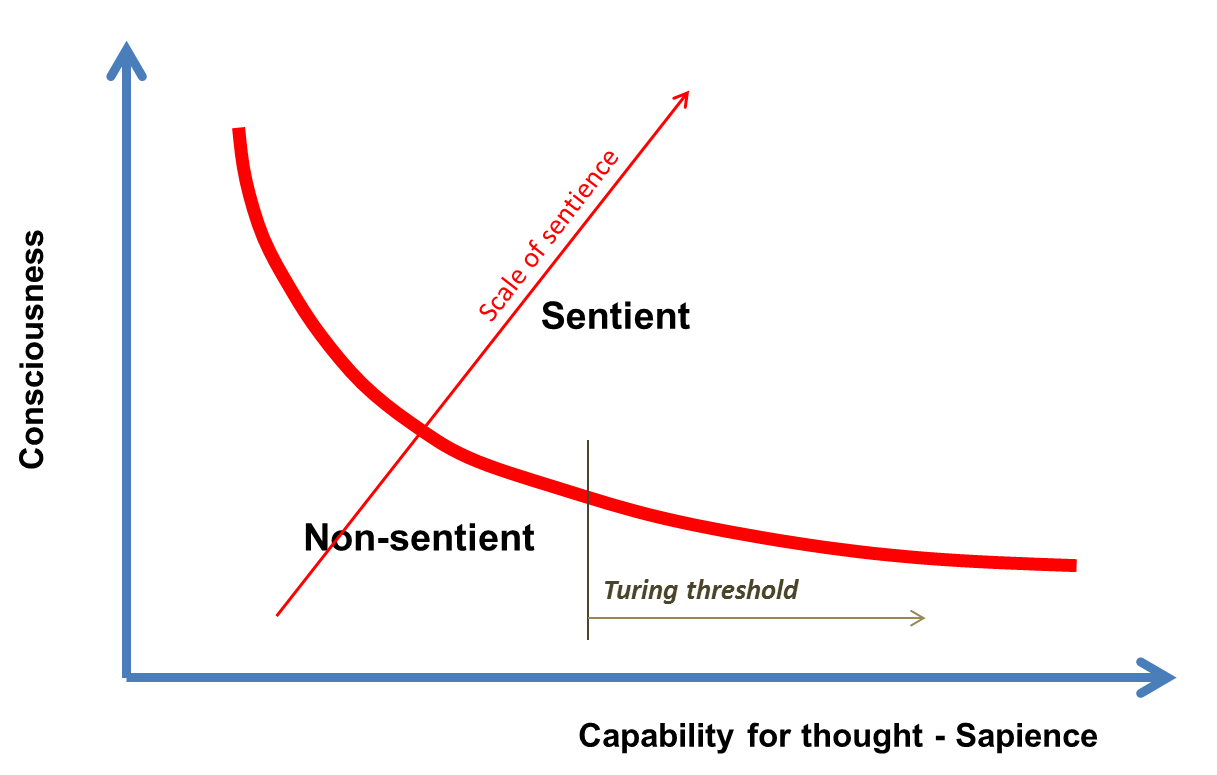i) Introduction
ii) The
Modal Argument Against Physicalism
iii) What
is it like...?
iv) The
Bogey of Epiphenomenalism
Firstly,
Frank
Jackson
introduces us to Fred. Fred can see two colours in a given area;
whereas we can see only one. The problem is that he's unsuccessful
when it comes to teaching the rest of us the difference between red-1
and red-2.
We can't make that distinction. Fred, therefore, concludes that “the
rest of the world is
red-1/red-2
colour-blind”.
The point is that Fred has a different phenomenal experience
to
the rest of us. He has the “ability” to distinguish two shades of
red which we can't distinguish.
Jackson
concludes that it won't help us to understand the difference between
red-1
and red-2
even if we were to know everything
there is to know, physically, about both red-1
and red-2.
There must therefore be a phenomenal
gap
between the physical and either
red-1
or red-2
(perhaps both). Either one or both must run free (as it were) of any
physical underpinning.
Despite
all that, researchers do find a physical explanation as to why Fred
can distinguish between red-1
and red-2.
In this hypothetical situation
we
“find
out that Fred’s cones respond differentially to certain light waves
in the red section of the spectrum that make no difference to ours
(or perhaps he has an extra cone) and that this leads in Fred to a
wider range of those brain states responsible for visual
discriminatory behaviour”.
Yes,
you guessed it, this imaginary state of physical affairs doesn't have
the slightest impact on Jackson’s argument. It's indeed the case
that red-2
has its own physical underpinning. It's also the case that we have
full physical knowledge as to why Fred can distinguish between red-1
and red-2;
though we still can't distinguish red-1
from red-2.
We still can't read-off the extra colour from the new physical
information we've acquired of Fred’s brain, eyes, etc. And nor can
we infer or deduce what red-2
is like
from these physical facts. There's still a gap between our knowledge
of the physical and our knowledge (or lack of knowledge) of the
phenomenal (i.e., if we can call phenomenal knowledge, knowledge
at all).
The
Modal Argument Against Physicalism
Jackson
then brings on board a modal argument; as well as giving attention to
the possibility of zombies. In fact the zombie possibility starts off
with a logical argument - or at least with a statement about the
limits of logical
entailment.
Mary
may well have all the physical information about red (or about red’s
physical underpinnings). Similarly, we may have all the physical
information about what seems to be another person. Jackson argues
that
“no
amount of physical information about another logically entails that
he or she is conscious or feels anything at all”.
This
is an incredible conclusion. It's not only about the possibility of
zombies: it also applies to all our fellow human beings. Perhaps it's
a new take on the “problem
of other minds”
in that Jackson argues that a complete physical picture won't tell us
whether or not another being is conscious or feels anything at all.
As with other-minds arguments, we inductively infer that other people
have minds and feel pain because of their behaviour and what they say
(although verbal expressions are a form of behaviour). Though, again,
we can't say that behaviour alone
logically entails consciousness or pain. However, we have good
reasons
to believe that other people do suffer pain, etc. (though that’s
another story). In the case of zombies, we can say that a zombie is
physically and behaviourally identical to us, yet he won't be
conscious and he won't feel pain. More technically, he may have the
same “functional states” too. Jackson concludes by asking us a
very telling and simple question:
“But
then what is it that we have and they lack?”
Of
course he answers his own question thus:
“Not
anything physical…”
Jackson's
self-questioning concludes with the statement
that
“[c]onsequently
there is more to us than the purely physical”. Thus: “Thus
Physicalism is false.”
As
it stands, this seems to assume that the phenomenal - by definition -
must be nonphysical. Many philosophers reject this. Indeed, according
to certain physicalists
(such
as David
Lewis),
they do think that the phenomenal is something over and above the
physical – or, at the least, above the physical as we currently
describe it. (The point, however, is that we can't have new knowledge
of an experience of red, etc.) Jackson tells us that certain
philosophers
“sincerely
deny that there cannot be physical replicas of us in other possible
worlds which nevertheless lack consciousness”.
Perhaps
we can say here that such beings couldn't exist according to the
physical laws of our world. Aren’t philosophers usually talking to
us about the possibility
of zombies in our
world? Or, at the least, about zombies at a possible world which
still nevertheless shares our laws of nature? However, isn’t it
logically
possible
that zombies could exist not only at other possible worlds; but also
in our own? Isn't this scenario metaphysically possible?
What
is it like to be...?
Thomas
Nagel
offered us something very special to this general debate when he
published his paper,
‘What
is it like to be a Bat?’.
Very generally, S
can't tell us what it is like “from a bat’s point of view”. The
bat’s point of view is “not
our point of view”.
In addition, the bat’s point
of view
“is
not something captureable in physical terms which are essentially
terms understandable equally from many points of view”.
David
Hume
(according to Jackson) offered an argument that goes against the
general position (at this time). Hume
argued
that
“from
knowledge of some shades of blue we can work out what it would be
like to see other shades of blue”.
So
did Hume believe that we could deduce (or infer) what a new shade of
blue is like simply by studying the physical basis of the given
shades of blue? Or did Hume mean that we could work out a new shade
of blue from the shades of blue we've already seen (i.e., not from
the physical substructure of our known shades of blue)? These two
claims are quite different.
For
example, we could work out the physical substructure of another shade
of blue by examining it. Though we still couldn't imagine
another shade of blue. As for inferring another shade of blue simply
from our previous experiences of known shades of blue: this is
equally contestable and probably untrue. Indeed both hypotheses seem
untrue, at least prima
facie.
The
Bogey of Epiphenomenalism
What
is epiphenomenalism?
Well,
for a start, epiphenomenalists don't deny qualia.
However, they
do
“countenance
the idea that qualia are causally impotent with respect to the
physical world”.
Again,
believers in epiphenomenalism don't necessarily deny that there are
qualia. Instead they believe (or some of them do) that it's “possible
to hold that certain properties of certain mental states” can
indeed be seen as qualia. However, “their possession or absence
makes no difference to the physical world”. They are "causally
impotent".
“instantiation
of qualia makes a difference to other mental states though not to
anything physical”.
One
can immediately ask here whether or not it's coherent to deny qualia
causal efficacy at the same time as allowing that they may well make
a difference to other mental states (regardless of their effect on
anything purely physical).
There
are good reasons for holding that qualia are indeed causally
inefficacious.
For
example, “a quale like the hurtfulness of pain must be causally
efficacious in the physical world”. A pain is a phenomenal process
that can cause us, for example, to remove our hand from a fire. This
is a causal relation (or link) between phenomenal
pain
and the physical
movement of a hand. Surely this causal link is real. However, there's
a Humean argument against believing this which makes use of a general
position which is taken from Hume’s well-known stance on causality.
Jackson
writes:
"No
matter how often B
follows A,
and no matter how initially obvious the causality of the connection
seems, the hypothesis that A
causes B
can be overturned by an overarching theory which shows the two as
distinct effects of a common underlying causal process.”
We
can rewrite the passage above by making it germane to our current
debate. Thus:
No
matter how often the removing of one’s hands follows one's
experience of intense heat, and no matter how initially obvious the
causality of that connection seems, the hypothesis that the intense
heat causes the removal of one's hand can be overturned by an
overarching theory which shows the two as distinct effects of a
common underlying causal process.
In
that case, what would that common
underlying causal process
actually be? Why augment entities at all by positing yet another
causal process to account for the feeling of heat and the removal of
the hand? The epiphenomenalist argument would of course be that
instead of the feeling of intense heat being itself a cause of the
moving of the hand, there will be a causal process which subserves
the feeling of intense heat. It would be
that
underlying cause that prompts the sudden movement of the hand. The
feeling of pain (or the quale)
simply “rides on the top” of this so far undiscovered underlying
causal process.
So
why the quale or the feeling at all? What point does it serve? Why
not simply do without it? Why not give a fully physical and
behaviourist account of what happens? And if there is such an
account, then what point is pain from an evolutionary point of view?
Jackson alights on this last point. He
asks:
“We
may assume that qualia evolved over time… and so we should expect
qualia to be conducive to survival. The objection is that they could
hardly help us to survive if they do nothing to the physical world.”
The
assumption here is that everything
about
the human body and mind has its evolutionary value in the precise
sense that it helps us survive in some shape or form. This is
wrong... according to Darwinians.
Take
the well-known case of a coat being both warm and heavy, which
Jackson cites. A warm coat was clearly once conducive to survival for
all kinds of animal (including human beings). The problem is that
warm coats are also heavy coats. The coat’s heaviness was not
conducive to survival (for obvious reasons). However, this example of
both pro and con is adequately explained by evolutionists and indeed
by Jackson. He
writes:
“Having
a heavy coat is an unavoidable concomitant of having a warm coat…
and the advantages for survival of having a warm coat outweighed the
disadvantages of having a heavy one.”
“are
a by-product of certain brain processes that are highly conducive to
survival”.
As
is often the case in many debates in the philosophy of mind, the
problem of other minds also raises its head. In terms of qualia, we
can ask the following
question:
“[H]ow
can a person’s behaviour provide any reason for believing he has
qualia like mine, or indeed any qualia at all, unless this behaviour
can be regarded as the outcome of the qualia?”
Clearly
another person’s physical behaviour doesn't point directly - or
even indirectly - to the existence of qualia (like or unlike our
own). So what's the point of qualia? Even if that question was
answered a moment ago, can’t we still see this lack of behavioural
evidence for qualia - as well as their very existence - as pointing
us to the conclusion that behaviour must indeed be the outcome of
qualia? Clearly an epiphenomenalist can't accept this conclusion.
Jackson
then reiterates the basic epiphenomenalist position on qualia. He
writes:
“Now
the epiphenomenalist allows that qualia are effects of what goes on
in the brain. Qualia cause nothing physical but are caused by
something physical.”
We
know this position by now. However, the epiphenomenalist can still
give a physical or behaviourist account of qualia. He does so
in
the following way:
“Hence
the epiphenomenalist can argue from the behaviour of others to the
qualia of others by arguing from the behaviour of others back to its
causes in the brains of others and out again to their qualia.”
The
epiphenomenalist has already accepted qualia and he gives a physical
account of them. Thus if the epiphenomenalist accepts that he indeed
has qualia, he must make sense of this in terms of the behaviour of
other people. If other people behave like him, and he admits to his
own qualia, then he can happily accept that because others behave
like him, then they (probably?) also have their own qualia. And
because he's already argued that qualia are caused by the brain, then
the brains of other people must cause their qualia too. Thus qualia
are given a physical or behaviourist explanation, even if qualia are
still seen as being inefficacious physically.
Many,
if not all, epiphenomenalists argue that the supposed causal
impotence of qualia is a godsend for die-hard (neo)
dualists.
They merely “sooth” their “intuitions”. The fact remains,
however, that they are an "excrescence":
“They
do nothing, they explain nothing…”
At
least they do nothing and explain nothing if one accepts the general
epiphenomenalist position; which many philosophers of mind don't!
We
talked earlier about the relevance of evolutionary theory on the
qualia debate.
So
what about an evolutionary account of our knowledge - or lack thereof
- in regards to the reality of qualia? Perhaps our lack of knowledge
of qualia can also be explained in evolutionary terms. Jackson states
that
“it
is very likely that there is a part of the whole scheme of things,
maybe a big part, which no amount of evolution will ever bring us
near to knowledge about or understanding of”.
The
simple reason for this is that “such knowledge and understanding is
irrelevant to survival”. This may account for this epistemological
dearth on our part. Similarly, it's been argued (by, for example,
Donald
Davidson)
that certain false beliefs are quite helpful for survival in certain
contexts! In addition, Jackson’s position is a little like Colin
McGinn’s
in
that he talks in terms of “cognitive
closure”.
That is, we are (or we may be) cognitively incapable of acquiring a
complete knowledge of consciousness (or of qualia).
Perhaps
McGinn’s own position can also be given an evolutionary
explanation.
References











